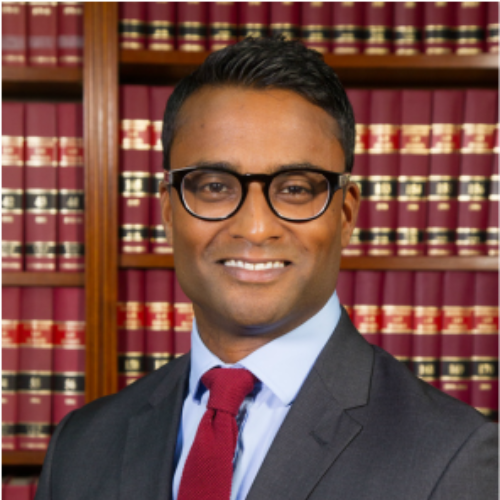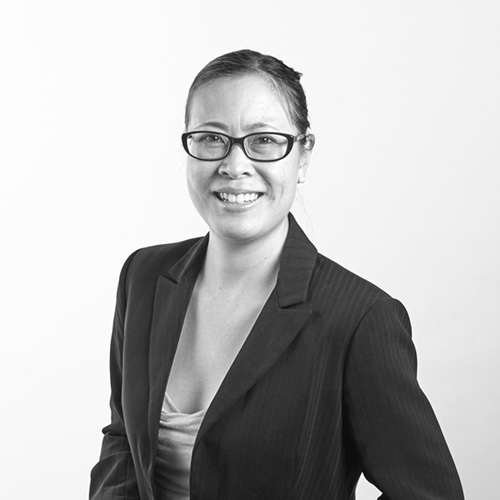- Autumn 2023
- Agent for Change, Lee-May Saw

In December 2023, Sam Pararajasingham (SP) (Forbes Chambers) interviewed the current advocate for cultural diversity, Lee-May Saw (LMS) (Frederick Jordan Chambers) about her experience at the Bar and her observations of the intersection between race and gender. The following sets out the questions and answers posed in the course of that interview.
SP: How long have you been at the Bar and what is the nature of your practice?
LMS: I have been at the NSW Bar since May 2010, so presently for over 12 years. My practice is primarily in two specialist areas of planning and environmental law and family law.
SP: What is your cultural background?
LMS: I am Australian born Chinese Malaysian. Both sides of my family are from the same province but different villages in the Southern province of Fu Jian or Hokkien in China. Both of my parents were born in Malaysia and met in Australia. My father came to Australia to study medicine and my mother came to Australia to work as a nurse. They migrated to Australia in the 1970s.

SP: Growing up what role did the intersection of race and gender play in the formation of your identity?
LMS: I grew up in Campbelltown in South West Sydney in the 1980s and 1990s. There weren’t many Asian families living in the Campbelltown Macarthur area at that time. We had a few family friends from Malaysia living in the local area who like my parents were doctor nurse couples. Catching public transport in those days could be a bit of an experience. We were commonly told to ‘go back to your own country’. In some ways I was lucky to have a father who due to his own experiences of racism brought my brother and me up with a clear understanding that we were Australian. He taught us to speak back and say ‘I don’t have any other country to go back to. I was born in Australia and Australia is my home.’ In my family and upbringing there was a combination of these kind of progressive and not so progressive approaches. It was almost, I would say, like a negotiation of approaches that make up my identity. In this fashion, the intersection of gender and race for myself personally, growing up in Australia as an overseas Chinese Malaysian woman, I would say was about pushing and negotiating boundaries, but also sometimes electing not to do so on family advice. Such advice was often influenced by collective experiences of racism and what was understood to be ‘reasonable’ for someone growing up Chinese Australian in Australia to achieve.
SP: What was your path to the Bar? Who/what were your inspirations in coming to the Bar?
LMS: Growing up I never really set out to come to the Bar or even do a law degree, because there was a lack of lawyers in my quite large extended family, and becoming a lawyer wasn’t really something an overseas Chinese Malaysian woman necessarily did. However, my father persuaded me to do a combined Arts/Law degree. I considered dropping out of law school a few times, but eventually decided in third year that because I felt I still had no idea what it would be like to be a lawyer, I would undertake some voluntary work experience one summer holidays at the Campbelltown Legal Aid office. I really enjoyed the work experience placement at the Legal Aid Office and then felt motivated to finish law school and practise law and get involved in litigation.
It was during this placement that I was put in touch with barristers for the first time while observing and assisting with complex criminal trials. One of these barristers is a woman barrister at my current chambers, Frederick Jordan Chambers. It was really meeting and being put in touch with barristers through the work experience I gained, and through being encouraged as a student to become an active member of professional legal associations such as the Women Lawyers’ Association of New South Wales, that I was inspired to come to the Bar.
SP: I can’t imagine there were too many women of Asian extraction at the Bar when you made your decision to come to the Bar. How, if at all, did that weigh into your considerations?
LMS: To be honest I had not thought much about my cultural background in coming to the Bar when I started at the Bar. I think this was because I was actively engaged in women’s and gender networks. I would attend seminars and talks about what it was like to be a woman coming to the Bar. Nothing was really available at the time about what it might be like to be someone from an Asian or migrant family background coming to the Bar. So, perhaps I was so focussed on what barriers there might be as a woman and how difficult that might be, that I was blissfully not tuned in to the possibility of anything else that might present extra challenges. I still found that actually starting at the Bar as a woman was not quite the same as what any of the talks or seminars might prepare you for. Moving from a branch of the profession where at the time there were obviously more women solicitors than women barristers was an experience I’d thought about a lot, but proved a much bigger change, transition and contrast than I had imagined at the time. In retrospect, it was really after I started at the Bar and began to participate on diversity and equality committees that it struck me how few Asian women barristers there were among the women’s networks and committees.
SP: Do you think there are factors unique to the experience of female migrants in Australian society? Do you think these matters are well understood/appreciated in broader society?
LMS: I think there are definitely factors unique to the experience of female migrants in Australian society. These experiences are ever-changing and diverse through different waves of migration and generations. My own experiences as an Australian born daughter of Chinese Malaysian migrant parents who migrated to Australia in the 1970s when the White Australia Policy was being wound back, will be quite different to the experiences of more recent waves of migrants directly from China. Yet we are all still members of the growing Chinese Australian community. I think much needs to happen before the experiences of female migrants will be properly understood and appreciated in broader society. Much of this I would say comes down to stereotyping and lack of knowledge or thinking that informs privileged worldviews.
SP: Just following on from that response, some might argue that migrant women have not been adequately accounted for in the drive towards gender equality in broader Australian society. Some might also observe that migrant women typically do not benefit (even indirectly) from access to institutional power structures or from nepotism. Care to comment?
LMS: I would agree that migrant women typically have not benefited from access to institutional power structures or nepotism. Successful senior migrant women continue to be an exception and are notably exceptional in how they have navigated the experiences they have had to battle to achieve career progression. The example of the Honourable Helen Sham-Ho OAM, the first Chinese member of a House of Representatives comes to mind. I marvel at and am greatly inspired by Helen’s endless positivity despite the challenges she had to face as an early migrant woman, working mother, and woman lawyer in parliament.
SP: What observations have you made about the intersection of race and gender at the Bar?
LMS: I think when it comes to diversity at the Bar, while there has been much hard work in this space and things are changing, it sometimes seems like gender is such a big issue to solve that there is very little air time or headspace left for race and gender or any other aspect or diversity and gender at the same time.
This is reflected in the fact that while an equitable gender briefing policy exists and continues to make a difference in relation to gender briefing practices, briefing policies in respect of other aspects of diversity including race and religion are yet to be properly formulated. This is a challenging and complex issue because while culturally diverse women at the Bar remain a marginalised minority compared to other women at the Bar, it is difficult not to suffer from somewhat torn loyalties. As a woman, not wanting to deny that gender equity is a serious issue at the Bar and take away from this in any way, while at the same time struggling to see whether any slice of the briefing pie exists for culturally diverse women at all, or how we even get the opportunity to mention this in the first place.
SP: Why did you agree to be an Advocate for Change? In the course of your tenure, what steps have you taken to promote diversity at the Bar? How has the Bar fared in that regard?
LMS: I agreed to being an Advocate for Change because I think it is a unique opportunity to address issues that need addressing. I was particularly excited about being asked to be Advocate for Change in the cultural diversity space as this provided a platform to focus on issues of cultural diversity somewhat separately from gender. I felt this was needed when I was asked to be Advocate for Change because it was at the start of COVID-19 impacted environments, and some very strong and outstanding work was happening on sexual harassment through the momentum of #MeToo and high profile and high publicity sexual harassment cases.
At the start of my term, I authored an opinion piece for Bar News, ‘In Search of the Crazy Rich Asians: Multiculturalism in Australia Post COVID-19’. I worked with the careers advisor at my former high school, North Sydney Girls High School on a special legal careers themed Careers Day at the school where I was part of two sessions presented to students about careers in the legal profession and at the Bar. Each of these sessions was presented with another speaker who had experience working overseas in an Asian country. I worked with the NSW Bar Diversity and Equality Committee on a discussion paper about cultural diversity at the NSW Bar, documenting some historical initiatives on cultural diversity at the Bar. I worked with the Asian Australian Lawyers Association NSW Branch on an online survey and focus groups project which collected data and published a report about barriers faced by culturally diverse solicitors in coming to the NSW Bar in addition to barriers to career progression in solicitor practice. I think there is still a mountain to climb in terms of breaking down barriers for cultural diversity at the Bar, but it has been a privilege to do some foundational work and use my term as Advocate for Change to do this. BN
